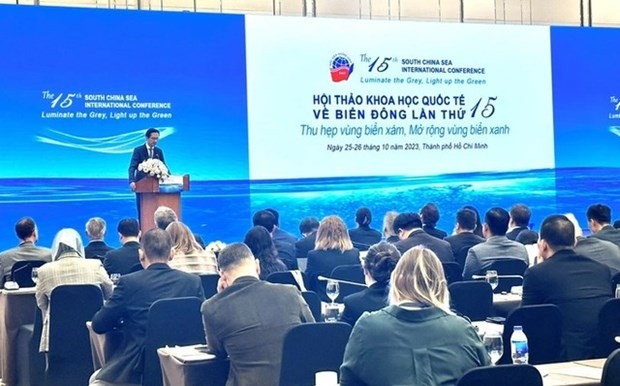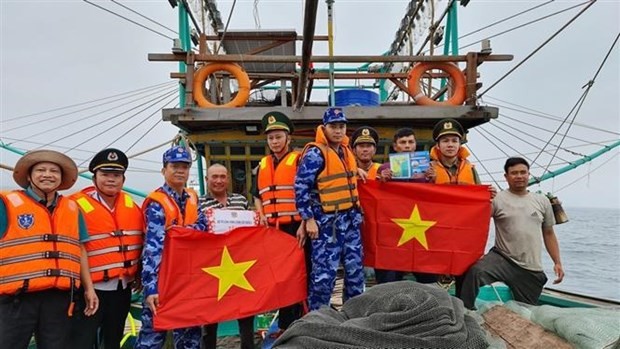
“Coast Guard diplomacy" to enhance cooperation in the East Sea : Experts
Latest
 |
| “Coast Guard diplomacy" to enhance cooperation in the East Sea: Overview of the 15th International Conference on the East Sea in Ho Chi Minh City from October 25-26, 2023. (Photo: WVR) |
Overlaps causing "Grey zones"
Most delegates expressed deep concern about "grey zones" activities, with a number of recently unilateral activities by Chinese Coast Guard Ships in the East Sea. At the same time, delegates emphasized the importance of cooperation among Coast Guard forces of regional coastal countries in the East Sea.
Regarding the East Sea issue, the Coast Guard force is a quite special one, both in terms of function and legal aspects. Clarifying the role of the Coast Guards also reflects the expectation of delegates attending international conference entitled "Luminate the Grey, Light Up the Green”, true to the theme of this year's Conference.
In principle, the Coast Guard is a force that protects territorial sovereignty, in areas clearly defined by international law. However, the problem lies in what delegates consider "troublesome" when domestic law conflicts with international law in defining disputed areas, meaning that law enforcement act of a country could violate international law in the process of implementing what they consider "compliance with national law".
Therefore, according to Associate Professor, Dr. Nguyen Hong Thao, a member of the International Law Commission of the United Nations (UN), currently, the use of the Coast Guard force according to national law to chase away or punish activities of people and forces of another country in overlapping and disputed areas could cause conflicts.
Associate Professor, Dr. Nguyen Hong Thao said that the issue of the Coast Guard reflects the connotation of the words "grey area" in the East Sea. That means, while applying international law and national law, there could be overlaps which can be interpreted differently, creating "grey zones" while countries give their own favourable interpretations.
"In addition, they can also use some other forces such as the maritime militia, a force with functions lining between civil and military. In the law, these terms and regulations are not clearly defined. Sometimes maritime militia force can be used to carry out military tasks in sovereignty and territorial disputes" Associate Professor, Dr. Nguyen Hong Thao explained further.
Building trust to stand side by side
In this context, at the 15th International Conference on the East Sea, participants emphasized the importance of Coast Guard diplomacy, expressing belief that small and medium-sized countries should promote cooperation, interaction with each other, act consistently and unanimously based on international law to create collective strength, including recommendations to institutionalize the ASEAN Coast Guard Forum.
Some delegates said that countries in the region need to unify the standards of Coast Guard ships, cooperate and share expertise in law enforcement at sea, protect safety, the marine environment and maintain order at sea, improving the skills and professionalism of the Coast Guards. It is suggested that the regional Coast Guards cooperate in building maritime security capacity with major countries inside and outside the region, and develop sets of rules to manage the behavior of the Coast Guards.
 |
| Vietnam Coast Guard presents national flags to fishermen. (Source: VNA) |
Regarding this issue, Mr. Hudiansyah Is Nursal, Deputy Director of Law and International Law of the Indonesian Maritime Security Agency (BAKAMLA), said that Indonesia focuses on how to cooperate with the Coast Guards of other countries in the region, because maritime security is essentially a transnational story.
"That's why we spend a lot of effort coordinating with the region, from Malaysia, Vietnam, the Philippines, to Singapore. Because I think with good coordination, with trust in each other, we can stand side by side", he said.
According to Mr. Nursal, Coast Guard cooperation between Indonesia and Vietnam is very strong. The two countries have also coordinated well with Malaysia in many different tasks, including search and rescue operations.
Cooperation and multilateralism were also especially emphasized by delegates within the framework of the 15th International conference to ensure peace and stability in the East Sea.
Acting Managing Director of Asia and Pacific of the European External Action Service (EEAS) Paola Pampaloni also commented: "Multilateralism is still the most effective tool in international relations, beneficial to all, helping countries work together to resolve disputes and achieve common goals."
According to Ms. Pampaloni, the 1982 United Nations Convention on the Law of the Sea (UNCLOS 1982) is a "guiding light" and a "lodestar" to peacefully settle disputes in the region. In addition, the EU supported the negotiation process led by ASEAN towards an effective, practical and legally binding Code of Conduct in the South China Sea (known in Vietnam as the East Sea) (COC) which must respect the interests of third parties and conform with international law, she affirmed.









